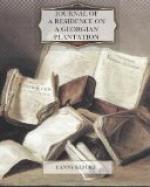This population is the direct growth of slavery. The planters are loud in their execrations of these miserable vagabonds; yet they do not see that, so long as labour is considered the disgraceful portion of slaves, these free men will hold it nobler to starve or steal than till the earth with none but the despised blacks for fellow-labourers. The blacks themselves—such is the infinite power of custom—acquiesce in this notion, and, as I have told you, consider it the lowest degradation in a white to use any exertion. I wonder, considering the burthens they have seen me lift, the digging, the planting, the rowing, and the walking I do, that they do not utterly contemn me, and indeed they seem lost in amazement at it.
Talking of these pine-landers—gypsies, without any of the romantic associations that belong to the latter people—led us to the origin of such a population, slavery; and you may be sure I listened with infinite interest to the opinions of a man of uncommon shrewdness and sagacity, who was born in the very bosom of it, and has passed his whole life among slaves. If any one is competent to judge of its effects, such a man is the one; and this was his verdict, ’I hate slavery with all my heart; I consider it an absolute curse wherever it exists. It will keep those states where it does exist fifty years behind the others in improvement and prosperity.’ Further on in the conversation, he made this most remarkable observation, ’As for its being an irremediable evil—a thing not to be helped or got rid of—that’s all nonsense; for as soon as people become convinced that it is their interest to get rid of it, they will soon find the means to do so, depend upon it.’ And undoubtedly this is true. This is not an age, nor yours a country, where a large mass of people will long endure what they perceive to be injurious to their fortunes and advancement. Blind as people often are to their highest and truest interests, your country folk have generally shown remarkable acuteness in finding out where their worldly progress suffered let or hindrance, and have removed it with laudable alacrity. Now, the fact is not at all as we at the north are sometimes told, that the southern slaveholders deprecate the evils of slavery quite as much as we do; that they see all its miseries; that, moreover, they are most anxious to get rid of the whole thing, but want the means to do so, and submit most unwillingly to a necessity from which they cannot extricate themselves. All this I thought might be true, before I went to




